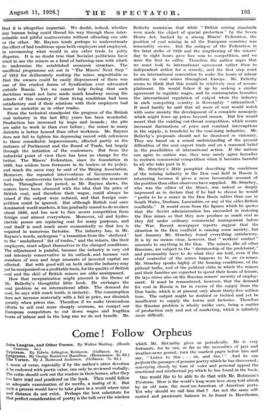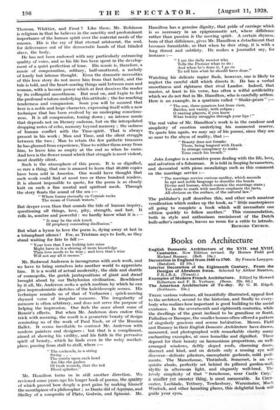Come ! Follow Orpheus
John Langton, and Other Poems. By Walter Marling. (Heath Cranton. 58.)
A noon of verse, especially if by the author's utter devotion it be endowed with poetic value, can only be reviewed verbally. The critic should seek out the readers in their homes, after they 100 have read and pondered on the book. Then could follow an adequate examination of its merits, a tasting of it. But such a process would have to take place in a world where time and distance do not exist. Perhaps the best substitute for that perfect consideration of poetry is the talk over the wireless
which Mr. McCarthy gives us periodically. He is very fortunate, for he can, so far as the necessities of jazz and weather-news permit, turn the marked pages before him and say, " Listen to this . . . oh, and this ! " And he can perform the passages of genuine poetry which he has discovered ; conveying closely by tone of voice and personal appeal the emotional and intellectual joy which he has found in the book.
One would like to be able to do that with Mr. Robinson's Tristram. Here is the world's long-worn love story told afresh by an old man, the most un-American of American poets. Yet why should we call him that ? Are not the same self- control and passionate balance to be found in Hawthorne.
Thoreau, Whittier, and Frost ? Like these, Mr. Robinson is religious in that he believes in the sanctity and predominant importance of the human spirit over the material needs of the masses. His is the cry of that eternal aristocrat, the soul.
for deliverance out of the democratic hands of that blinded slave, the body.
He has not been endowed with any particularly entrancing quality of voice, and so his life has been spent in the develop- ment of a quiet perfection of tone. His music is, therefore, a
music of compensation, solitary, half-unuttered, a melody of lonely but intense thought. Even the dramatic necessities
of this love story do not move him from that habit, and the tale is told, and the heart-searing things said between man and woman, with a laconic power which at first deceives the reader by its colloquial smoothness. But read on, and begin to feel
the profound wisdom underlying this attitude ; the far-reaching tenderness and compassion. Soon you will be assured that here is a noble and large character, expressing itself with a new technique that has been evolved by an unsleeping conscious- ness. It is all compression, toning down ; an intense music
that depends not on literary cadenza, but on the interpolated dropping notes of echo, memory beyond memory ; the sadness of human conflict with the Time-spirit. That is always present in his work ; Man and Time, and the silent struggle between the two ; Man to retain the few pathetic treasures he has gleaned from experience, Time to wither them away from him, to leave him as empty at the end as when he came. And love is the flower round which that struggle is most violent, most deathly silent.
Such is the atmosphere of this poem. It is so dignified,
so rare a thing, that one is amazed to learn that 40,000 copies
have been sold in America. One would have thought that such work could find at most two or three hundred readers. It is almost impossible to quote, for the poem is so closely knit on such a fine mental and spiritual mesh. Through
the story floats the sound of the sea :-
" Where foams eternally on Cornish rocks The moan of Cornish waters."
But deeper even than that sounds the tide of human inquiry, questioning all things, love, pity, strength, and lust. It rolls in, sombre and powerful : we hardly know what it is :—
" It may be the sick touch
Of prophecy concealing disillusion."
But what a hymn to love the poem is, dying away at last in a triumphant silence I For, as Tristram says to Isolt, as they stand waiting for fate to fall :- "Your love that I see looking into mine
Might have in it a shining of more knowledge Than love needs to be wise ; and love that's wise Will not say all it means."
Mr. Redwood Anderson is incongruous with such work, and we have to bring ourselves into another world to appreciate him. It is a world of actual modernity, the slide and shuttle of cosmopolis, the garish juxtapositions of giant and dwarf
brought about by our Babylonian civilization. Bewildered by it all, Mr. Anderson seeks a quick medium by which he can give impressionistic sketches of the kaleidoscopic scenes. His
technique reminds us of that of Verhaeren ; quick-moving rhymed verse of irregular measure. The irregularity of measure is often arbitrary, and does not serve the purpose of helping the impression. One feels the same about some of Renoir's effects. But when Mr. Anderson does endow this trick with meaning, the result is a geometric beauty of design reminding us of the work of Paul Nash, or of the Russian Ballet. It seems inevitable to contrast Mr. Anderson with modem painters and designers : but that is a compliment, aimed at showing his virility, and his faith in the pervasive spirit of beauty, which he finds even in the noisy market- place, passing from stall to stall, where :-
" The cockerels, in a string Swing . . .
The combs upon each head Are like the gashes Of fresh wounds, that the red Blood splashes."
Mr. Hamilton turns us in still another direction. We
reviewed some years ago his longer book of poems, the quality of which proved how deeply a poet gains by making himself
the mouthpiece of a philosopher ; as Dante did of Aquinas, and Shelley of a composite of Plato, Godwin, and Spinoza. Mr.
Hamilton has a genuine dignity, that pride of carriage which is so necessary in an epigrammatic art, where diffidence rather than passion is the moving spirit. A certain shyness, born of that diffidence, gives Mr. Hamilton a detachment that becomes formidable, so that when he does sting, it is with a long thrust and subtlety. He makes a journalist say, for instance " I am the daily mentor who
Tells the Premier what to do : And when he's done it, I go on To tell him what he should have done."
Watching his delicate rapier flash, however, one is likely to neglect the careful skill which directs it. He has a verbal smoothness and rightness that rival Landor. Indeed, that master, at least in his verse, has often a wilful artificiality which we do not find in Mr. Hamilton, who is carefully artless. Here is an example, in a quatrain called " Shikespeare "
- " The sun, three-quarters lost from view, Battles, not vainly, with eclipse ; 0 ranting players, if you knew What beauty struggles through your lips ! "
The real value of Mr. Hamilton's work is in the candour and simplicity of emotion underlying his mannered reserve. To quote him again, we may say of his poerni; since they are so near to the abyss of reality, that :—
" Beauty does not forsake
Them, being leagued with Death In strange conspiracy to make Time catch his breath."
John Langton is a narrative poem dealing with the life, love, and salvation of a fisherman. It is told in limping hexameters, and decorated with pious moralizings such as this comment on the marriage service :- " The marriage service curious medley, which ascends In apt and noble language to describe the--bonds Divine and human, which contain the marriage state ; Yet sinks to mark with needless emphasis the facts, All obvious on the surface, of the natural law."
The publisher's puff describes this, and other such amateur versification which makes up the book, as " little masterpieces all going to complete a book which will - necessitate one edition quickly to follow another." This 'commendation, both in style and enthusiasm reminiscent of the Dutch bulb-seller's catalogue, leaves no room for a critic to intrude.
RICHARD CHURCH.





























 Previous page
Previous page